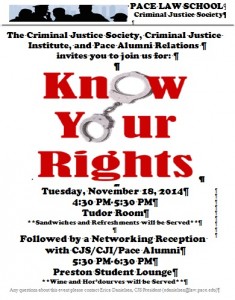The Newburgh Sting Event Wrap-Up
On behalf of Prof. Lissa Griffin who was instrumental in making this event a reality.
What could be better than a terrific film documentary about a sensational criminal case and a panel discussion with the director and the lawyers who defended the four defendants, several of whom were Pace Law grads. That was Tuesday evening in the Moot Court Room. Many thanks to Prof. Lou Fasulo, Prof. Lucie Olejnikova, Iris Mercado, Jessica Dubuss, Joan Gaylord, Judy Jaeger, Janice Dean, Kay Longworth, Tony Soares, Glen Quillen, Ann Marie Stepancic, and of course the Criminal Justice Society and its president, Erica Danielson, for their help in making this such a successful event. We had approximately 130 people – an interesting mix of students, CLE participants, alums, and the public – attend the screening of The Newburgh Sting HBO documentary, an almost unbelievable critique of one investigation and prosecution in the government’s “War on Terrorism.”
The government certainly has a legitimate interest in uncovering people in the United States who are intent on joining a terrorist plot against the Country. In this case, that is what it apparently set out to do. But here, four poor African American men from Newburgh, NY, previously unknown to the government, were induced by an FBI informant – with the most lavish kinds of benefits – to attempt to bomb synagogues in Riverdale, NY and military transports on Stewart Air Force Base. They never saw a Stinger missile in their lives – indeed, they were unemployed and owned no cars or even bicycles – until such a weapon along with non-functioning bombs were produced by the undercover agent. As the trial judge stated, they would have done nothing unlawful or remotely terrorist-related if the government had left them alone. Still, they were convicted as willing joiners in this plot. The jury took eight days to convict, and the Second Circuit upheld the convictions, with a dissenting judge holding the defendants were entrapped as a matter of law. It’s a fascinating and provocative case.
The panel of lawyers addressed important issues about the nature of our criminal justice system, the role of defense lawyers and prosecutors, the law on entrapment, trial tactics, and the legitimate government interest in the prosecution of prospective terrorists, and the director, who was an attorney and ex-prosecutor himself, brought a unique perspective to the issues.
Thanks to all who made this possible! Lissa

